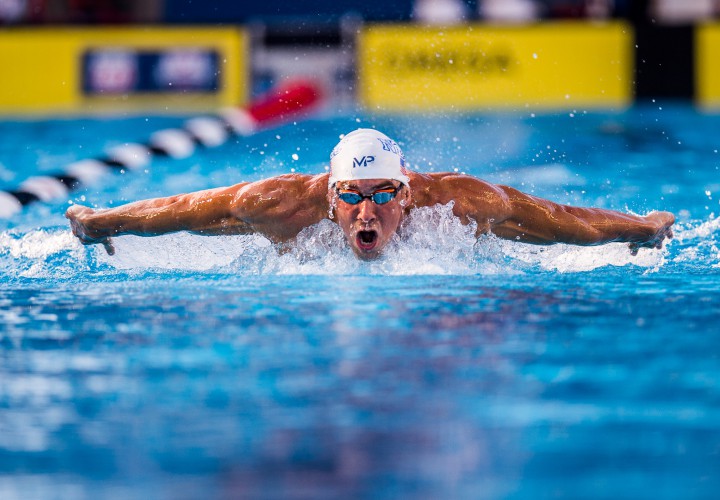
If ever you doubted that Michael Phelps is the Greatest Of All Time (the GOAT), then Rio 2016 would have put paid to that.
Swimming in his fifth Olympic Games, Phelps finished the Rio swimming competition with a total of 23 gold medals – 12 individual medals, 11 relay medals – three silver medals and two bronze medals over five Olympic Games stretching 16 years. If he was a country, he would be ranked 32nd in the world.
Phelps was not among the medals at his first Olympics at Sydney 2000, but savvy swimming observers noticed the extra long-torso and arms of the tall 15-year-old who managed to get into the finals of the 200 meter butterfly. He finished fifth swimming, with commentators noting he was “one to watch.”
By the time Athens 2004 rolled-around, he was a household name. In World and Pan-Pacific Championships from 2001 onward, he had broken multiple world records. He cemented his position as the world’s best swimmer with his performance in Athens with six gold medals, two in relays, and two bronze medals. He set one world record and three Olympic records in the individual events. He was only 19.
But Athens 2004 was merely the amuse bouche of what was to come at Beijing 2008.
Eight events, eight gold medals, seven world records, one Olympic record. He was still only 23.

He turned-up again at London 2012 to bag another four gold medals, two in relays, and two silver medals. For the third consecutive Olympics, he was the best swimmer at the competition and received recognition from the world swimming body, FINA, as being the most decorated Olympian with his 22 medals, surpassing Soviet gymnast Larisa Latynina’s previous record of 18.
Retirement seemed the thing to do.
Motivated by the US lack of success in the freestyle relay since the 2009 World Championships, Phelps announced he was coming out of a short-lived retirement in 2014. Ever since, he has just kept swimming and swimming – not all of it competitively due to a ban – until Rio 2016.
He was rewarded by being named captain of the US Olympic team and was the flagbearer for the Opening Ceremony, reportedly two things he had aspired to. Many of his team-mates, especially fellow swimmers, would have no memory of an Olympic Games without him.
Apart from all the medals and all the world records, and his undoubted status as the GOAT, there are three remarkable things about Michael Phelps.
1. His longevity and success have been achieved drug-free.
Phelps is a volunteer member of the United States Anti-Doping Agency’s Project Believe which conducts athlete tests in excess of World Anti-Doping Agency requirements. He has always passed the tests administered to him.
2. He’s had the same coach since 1996 when he was 11
Phelps followed coach Bob Bowman from his home town of Baltimore to the University of Michigan, back to Baltimore and to Arizona. Phelps says it is the “smartest thing I’ve ever done.”
3. He may be the GOAT, but he’s not perfect.
Three times he has done the wrong thing. The first time was weeks after the Athens Olympics, when he was caught driving under the influence (DUI) and sentenced to 250 hours of community service and rehab. Six months following Beijing 2008, he was caught smoking marijuana, lost a lucrative sponsorship because of it, apologized, and was suspended by US Swimming for three months. Most recently, he was caught DUI and speeding just as he emerged from his first retirement two years ago. He was given a six months suspension by USA Swimming – so no competitive swimming until March 2015 – and underwent another bout of rehab. According to Bowman, who knows him about as well as anyone, rehab changed Phelps for the better the second time around.
There have been suggestions from other athletes that Phelps’ declaration of retirement will not stick because now, having 23 gold medals, the next goal will be 25.
At 31 and a new dad, Phelps says he wants to enjoy fatherhood. He would know also that he was the second oldest swimmer ever to win an individual gold medal in these Games and he has not set a world record since 2009. He is smart and I think he means what he says.
He once said that he wanted to change the face of swimming. He has done that. You see it when you see the photos of him with a young Katie Ledecky or Joseph Schooling. He will be a role model for generations of swimmers to come.
However, I hope he takes that further.
I believe Michael Phelps could have a huge role in helping to clean-up doping in sport – not just swimming. He has unassailable moral authority to do so. If the GOAT spoke out about doping, even the International Olympic Committee would have to listen – despite their brass monkey approach to most issues.
The previous GOAT in the swimming pool, the legendary Mark Spitz, said in Bob Schaller’s 2008 biography of Phelps, that Phelps is not only “the greatest swimmer of all time and the greatest Olympian of all time, he’s maybe the greatest athlete of all time.”
Eight years on, I reckon there’s no maybe about it.
By Jaimie Fuller
Republished with permission from insidethegames.biz.